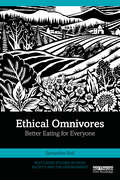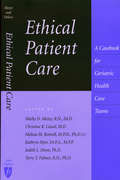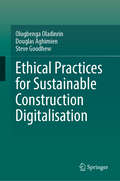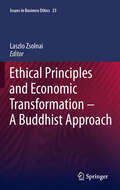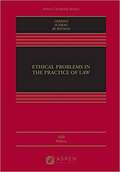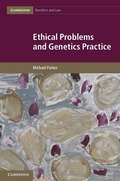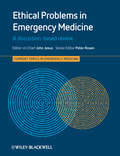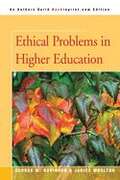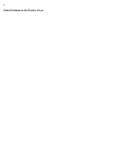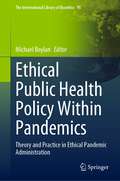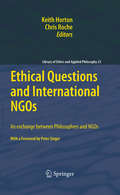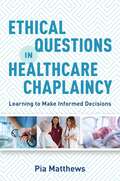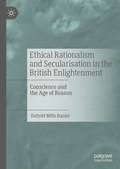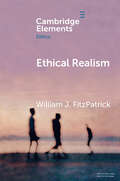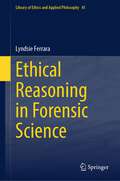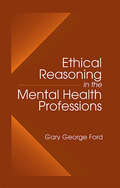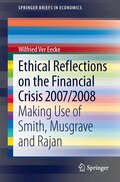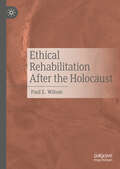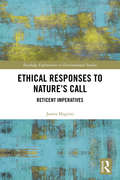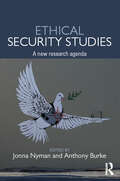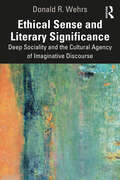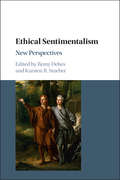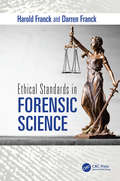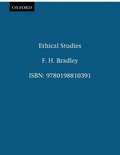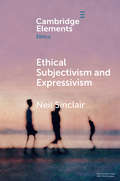- Table View
- List View
Ethical Omnivores: Better Eating for Everyone (Routledge Studies in Food, Society and the Environment)
by Samantha NollThis book provides a detailed overview of ethical omnivorism, as well as the philosophical foundations of this movement and diet.Many eaters are concerned about the impact that their food choices have on the environment, animals, and human health. Ethical omnivorism is at once a new food ethic, diet, and global movement aimed at providing a flexible path for eaters committed to bringing about lasting change one meal at a time. While publications in food ethics are largely dominated by vegetarian titles, this book explores the viability of omnivorism, a dietary choice which is not devoid of animal products, but one which embraces eating local, eating organic, and eating humanely raised food products. In doing so, this diet builds on the local food movement’s desire to know where food comes from and stresses the importance of maintaining high animal welfare and environmental standards. Overall, this book provides a foundational overview of ethical omnivorism as a food movement and guidance for those interested in eating ethically, while recognizing that many factors influence dietary choices.This book will be of great interest to students and scholars of food studies, food, agriculture and animal ethics, environmental philosophy, and those more widely interested in making ethical food choices.
Ethical Patient Care: A Casebook for Geriatric Health Care Teams
by Mathy D. Mezey … [et al.].The delivery of good medical care often involves professionals from various disciplines working together. Interdisciplinary health care teams can be especially valuable in managing patients with complex medical and social needs, such as older persons in hospital, community, or home settings. Such teams, however, can also complicate or even create problems because of their diverse views and responsibilities. Ethical Patient Care: A Casebook for Geriatric Health Care Teams is designed to teach effective and responsible group decision making to clinicians working in teams to treat older patients. The editors use the case study method to present ethical dilemmas that team members encounter in the management of geriatric patients. Patients with multiple chronic conditions so often require the care of more than one medical specialist, and in the introductory chapters the editors suggest ways to resolve conflicts among patients, health care professionals, and the institutions that support them, including hospitals, HMOs, insurance companies, and the government. The book is then divided into four sections, each dealing with one angle of the team-care picture. The first section treats the diverse ethical imperatives of various professionals, conflicts among disciplinary approaches, and and varying attitudes toward end-of-life- decision making. Section two focuses on the patient and covers patient confidentiality, family decisionmaking and interaction with the healthcare team, issues of patient and team nonadherence to the care plan, and elder abuse and neglect. Section three examines the emerging difficulties of decentralized health care in settings such as hospitals, nursing homes, and the home, including clinician accountability and how ethical dilemmas differ across settings. Section four discusses the problems arising from the increasing responsibility of clinicians to manage costs and serve the interests of hospitals and insurers. Ethical Patient Care is a valuable resource for bioethicists, gerontologists, and the physicians, nurses, social workers, and therapists who care for aging persons.
Ethical Practices for Sustainable Construction Digitalisation
by Steve Goodhew Douglas Aghimien Olugbenga OladinrinThis volume provides a framework for ethical and sustainable digitalization in the construction industry. The fourth industrial revolution has significantly changed how industries worldwide operate and deliver their products and services. This paradigm shift has brought with it ubiquitous emerging physical, biological and digital technologies that are disrupting activities in industries across the globe. The construction industry is not immune to the disruption of these technologies. From solving the issues of poor cost, time and quality that has bedevilled the industry for a long while to ensuring clients are satisfied and workers are safe, digital technologies have proven to be effective in improving how the construction industry function. For instance, the use of building information modelling has garnered considerable attention in addressing salient design and collaboration issues, among others, facing the industry. In the same vein, the internet of things, big data analytics, cloud computing, drones, robotics, sensors and a host of other technologies have been explored to improve the management and delivery of construction projects. Regrettably, this concept of ethics has been downplayed in the quest for the digital transformation of construction industries worldwide. For the successful digitalisation of the construction industry, which relies heavily on human interaction with technology, the role of ethics cannot be overlooked. There is an absence of a roadmap for the ethical use of digital technologies in the digitalisation of the construction industry. This book, which is designed to give direction for the ethical use of digital tools in the construction industry, fills that gap.
Ethical Principles and Economic Transformation - A Buddhist Approach
by Laszlo ZsolnaiBuddhism points out that emphasizing individuality and promoting the greatest fulfillment of the desires of the individual conjointly lead to destruction. The book promotes the basic value-choices of Buddhism, namely happiness, peace and permanence. Happiness research convincingly shows that not material wealth but the richness of personal relationships determines happiness. Not things, but people make people happy. Western economics tries to provide people with happiness by supplying enormous quantities of things and today's dominating business models are based on and cultivates narrow self-centeredness.But what people need are caring relationships and generosity. Buddhist economics makes these values accessible by direct provision. Peace can be achieved in nonviolent ways. Wanting less can substantially contribute to this endeavor and make it happen more easily. Permanence, or ecological sustainability, requires a drastic cutback in the present level of consumption and production globally. This reduction should not be an inconvenient exercise of self-sacrifice. In the noble ethos of reducing suffering it can be a positive development path for humanity.
Ethical Problems In The Practice Of Law (Aspen Casebook Series)
by Philip G. Schrag Lisa G. Lerman Robert RubinsonThis problem-based book reflects the authors' broad range of teaching, clinical, and policy-making experience. Ethical Problems in the Practice of Law's carefully crafted ethical problems challenge students to engage in a deep analysis and participate in lively class discussion. New to the Fifth Edition: Comprehensive updates to reflect the many new developments in this fast-moving field. The authors carefully revised the entire text, adding six new problems and countless new case examples to illustrate the operation of "lawyer law." Expanded coverage of ethics issues for arbitrators and mediators. Expanded coverage of the ethical challenges and pitfalls faced by lawyers in light of advancing technology. Deeper discussion of issues of diversity and discrimination in the legal profession. Updated and enhanced materials on innovations and transformations in the legal profession and the regulation of lawyers in the United States and abroad, including innovation in financing law practice and litigation, and offshoring legal work. Additional material on continuing efforts to address the unmet need for legal services, including licensing of nonlawyers to provide limited legal services. Professors and students will benefit from: Real-world problems, most based on actual cases, in which students are asked to step into the shoes of practicing lawyers to confront difficult ethical dilemmas that often arise in the early years of law practice. Problem-based approach, often based on real-life cases, offers students a practical way to test their understanding Problem method engages students and generates class discussion, because most problems present head-scratching dilemmas that students must puzzle through together Graphics (cartoons, tables, photos) throughout, which make the presentation lively and engaging Clear expositions of the law allow professors to devote the majority of class time to interactive discussion of the problems Transformation of a course from an often-boring upper-class requirement to a learning environment that is educationally rich, engaging and fun Shocking examples of recent lawyer misconduct maintain student interest A readable and enjoyable law school textbook
Ethical Problems and Genetics Practice
by Michael ParkerEthical Problems and Genetics Practice provides a rich, case-based account of the ethical issues arising in the genetics clinic and laboratory. By analysing a wide range of evocative and often arresting cases from practice, Michael Parker provides a compelling insight into the complex moral world of the contemporary genetics professional and the challenges they face in the care of patients and their families. This book is essential reading for anyone interested in the ethical issues arising in everyday genetics practice. Ethical Problems and Genetics Practice is also a sustained engagement with the relationships between bioethics and social science. In proposing and exemplifying a new approach to bioethics, it makes a significant contribution to debates on methods and interdisciplinarity and will therefore also appeal to all those concerned with theoretical and methodological approaches to bioethics and social science.
Ethical Problems in Emergency Medicine
by John Jesus Peter Rosen James G. Adams Arthur R. Derse Shamai A. Grossman Richard WolfeThis book is designed to consolidate the relevant literature as well as the thoughts of professionals currently working in the field into a practical and accessible reference for the emergency medical technician, student, nurse, resident, and attending emergency physician. Each chapter is divided into four sections: case presentation, discussion, review of the current literature, and recommendations. Designed to serve simultaneously as a learning and reference tool, each chapter begins with a real case that was encountered in an ED setting. The case presentation is followed by a short discussion of the case, as if at a morbidity and mortality conference, by a panel of experienced attending physicians explaining how they would approach the ethical dilemmas associated with the case, and a review of the existing literature.
Ethical Problems in Higher Education
by Janice Moulton George M. RobinsonThe Ivory Tower Myth suggests that the world of higher education has no moral problems. Unlike ethical conflicts in business, politics and medicine, ethical problems in higher education receive little publicity. But devotion to the pursuit of knowledge does not ensure ethical behavior. Power, competition, pressure and lust for recognition create moral conflicts. Some are unique to higher education but many are common to the world off-campus. <p><p> This book uses ethical theories as a tool to analyze real examples from our colleges and universities. Topics include: academic freedom, plagiarism, cheating, research fraud, equal opportunity, evaluation, tenure, student-faculty relationships.
Ethical Problems in the Practice of Law: Concise Edition
by Philip G. Schrag Lisa G. LermanThis book is an introduction to the law that governs lawyers. It includes two chapters on some important aspects of the legal profession.
Ethical Public Health Policy Within Pandemics: Theory and Practice in Ethical Pandemic Administration (The International Library of Bioethics #95)
by Michael BoylanThis book contains original essays that look at contagious/infectious disease pandemics and the ethical public policy and administration these have entailed. In particular, the pandemics of the 1918 flu pandemic, HIV in the 1990s, SARS in 2003, Ebola from 2014–2016 and the novel COVID-19 in 2020 are highlighted. The contributions in this work offer the reader insights in these and several other recent pandemics that present differently—either via contagion or mortality rate—and how each should be addressed by countries of various sorts. This book is a must for the ongoing debate on how we should treat public health crises, such as the one we have all just encountered in the novel COVID-19 pandemic.
Ethical Questions and International NGOs
by Keith Horton Chris RocheIn recent decades there has been a great expansion in the number, size and influence of International Non-Governmental Organisations (INGOs) involved in international relief and development. These changes have led to increased scrutiny of such organisations, and this scrutiny, together with increasing reflection by INGOs themselves and their staff on their own practice, has helped to highlight a number of pressing ethical questions such organisations face, such as: should INGOs attempt to provide emergency assistance even when doing so risks helping to fuel further conflict? How should INGOs manage any differences between their values and those of the people they seek to benefit? How open and honest should INGOs be about their own uncertainties and failures? This book consists of sustained reflections on such questions. It derives from a workshop held at Melbourne University in July 2007 that brought together a group of people - for the most part, reflective practitioners and moral and political philosophers - to discuss such questions. It explores honestly some of the current challenges and dilemmas that INGOs face, and also suggests some new ideas for meeting these challenges. Our hope is that the kind of explicit reflection on the ethical issues INGOs face exemplified in this publication will help to promote a wider debate about these issues, a debate that in turn will help INGO managers and others to make better, wiser, more ethically informed decisions.
Ethical Questions in Healthcare Chaplaincy: Learning to Make Informed Decisions
by Pia MatthewsThis textbook untangles the complicated ethical dilemmas that arise during the day-to-day work of healthcare chaplaincy, and offers a sturdy but flexible framework which chaplains can use to reflect on their own practice. Tackling essential issues such as consent, life support, abortion, beginning and end of life and human dignity, it enables chaplains to tease out the ethical implications of situations they encounter, to educate themselves on relevant legal matters and to engage with different ethical viewpoints. The book combines case studies of familiar scenarios with thorough information on legal matters, while providing ample opportunity for workplace reflection and offering guidance as to how chaplains can best support patients and their families while preserving their own integrity and well-being. Clear, sensitive and user-friendly, this will be an indispensable resource for healthcare chaplains and all healthcare professionals interested in spiritual care.
Ethical Rationalism and Secularisation in the British Enlightenment: Conscience and the Age of Reason
by Dafydd Mills DanielThis book reassesses the ethics of reason in the Age of the Reason, making use of the neglected category of conscience. Arguing that conscience was a central feature of British Enlightenment ethical rationalism, the book explores the links between Enlightenment philosophy and modern secularisation, while responding to longstanding criticisms of rational intuitionism and the analogy between mathematics and morals, derived from David Hume and Immanuel Kant. Questioning in what sense British Enlightenment ethical rationalism can be associated with a secularising ‘Enlightenment project’, Daniel investigates the extent to which contemporary, and secular liberal, invocations of reason and conscience rely on the early modern Christian metaphysics they have otherwise disregarded. The chapters cover a rich collection of subjects, ranging from the Enlightenment’s secular legacy, reason and conscience in the history of ethics, and controversies in the Scottish Enlightenment, to the role of British moralists such as John Locke, Joseph Butler and Adam Smith in the secularisation of reason and conscience. Each chapter expertly refines Enlightenment ethical rationalism by reinterpreting its most influential proponents in eighteenth-century Britain – the followers of ‘Isaac Newton’s bulldog’ Samuel Clarke – including Richard Price (Edmund Burke’s opponent over the French Revolution) and John Witherspoon (the only clergyman to sign the US declaration of Independence).
Ethical Realism (Elements in Ethics)
by William J. FitzPatrickThis Element examines the many facets of ethical realism and the issues at stake in metaethical debates about it—both between realism and non-realist alternatives, and between different versions of realism itself. Starting with a minimal core characterization of ethical realism focused on claims about meaning and truth, we go on to develop a narrower and more theoretically useful conception by adding further claims about objectivity and ontological commitment. Yet even this common understanding of ethical realism captures a surprisingly heterogeneous range of views. In fact, a strong case can be made for adding several more conditions in order to arrive at a proper paradigm of realism about ethics when understood in a non-deflationary way. We then develop this more robust realism, bringing out its distinctive take on ethical objectivity and normative authority, its unique ontological commitments, and both the support for it and some challenges it faces.
Ethical Reasoning in Forensic Science (Library of Ethics and Applied Philosophy #41)
by Lyndsie FerraraThis book explores the impact of ethical reasoning in forensic science and demonstrates that it is in fact a foundational skill required by those engaged in the field. Forensic science is viewed as a mechanism to aid the criminal justice system in finding truth, but failures within the field contribute to the growing injustice facing society. The author recognizes these failings and brings a new perspective by establishing bioethical principles as a foundation for improving ethical reasoning skills. These skills are a critical component of forensic science education for upcoming professionals. While other books focus on egregious cases of ethical misconduct, this text highlights the daily decisions and issues that occur during the forensic investigation and analysis processes. It is written for future forensic professionals and forensic science educators, as well as those individuals already working in the forensic science field.
Ethical Reasoning in the Mental Health Professions
by Gary G. FordThe ability to reason ethically is an extraordinarily important aspect of professionalism in any field. Indeed, the greatest challenge in ethical professional practice involves resolving the conflict that arises when the professional is required to choose between two competing ethical principles. Ethical Reasoning in the Mental Health Professions e
Ethical Reflections on the Financial Crisis 2007/2008
by Wilfried Ver EeckeIn this book the author reflects on the philosophical and ethical bases of the financial crisis 2007-08 and the subsequent recession. He finds in Adam Smith solid arguments for the new free market economy, capitalism, but also arguments for a role for the government in the case of public goods (roads) and of merit goods (education, control of banking). Where the provision of public goods requires that the government respect consumer sovereignty there the provision of merit goods legitimizes the violation of that principle. By making use of the history of economic thought (e.g., the neo-liberal tradition) the author demonstrates that Musgrave's idea of merit goods can be expanded to eleven domains in which the government has an important function. He legitimizes that move by using the Kantian argument that we must accept the possibility conditions for what we want. The author demonstrates that Rajan, Reich and Reinhart & Rogoff make use of seven of his eleven categories of merit goods in order to explain the financial crisis 2007-08 and the subsequent recession. The author thereby provides a philosophical and ethical analysis of the government's failures at the basis of the financial crisis.
Ethical Rehabilitation After the Holocaust
by Paul E. WilsonGenocide murders innocents in a society, and it leaves behind moral corruption and societal twistedness. A genocide like the Holocaust can happen only if the normative ethical commitments to honor the fundamental right to life are compromised or abandoned. When a society lives through a genocide, the moral imagination of peoples and collectives, their ethical behaviors, and even the underlying social contract become twisted and broken. Societies and individuals caught within a genocide need an ethical rehabilitation to move a post-genocidal society out of its ethical degradation. This book discusses the steps of transitional justice as ethical ways to move individuals and societies away from lingering injustices and toward an equilibrium of justice.
Ethical Responses to Nature’s Call: Reticent Imperatives (Routledge Explorations in Environmental Studies)
by James MagriniArguing for a renewed view of objects and nature, Ethical Responses to Nature’s Call considers how it is possible to understand our ethical duties - in the form of ethical intuitionalism - to nature and the planet by listening to and releasing ourselves over to the call or address of nature. Blending several strands of philosophical thought, such as Graham Harman’s Object-Oriented Ontology, W. D. Ross’s prima fathics, Alphonso Lingis’s phenomenological ethics traceable to The Imperative, and Michael Bonnett’s ecophilosophy, this book offers a unique rejoinder to the problems and issues that continue to haunt humans’ relationship to nature. The origins of such problems and issues largely remain obscured from view due to the oppressive influence of the "Cultural Framework" which gives form and structure to the ways we understand, discourse on, and comport ourselves in relation to the natural world. Through understanding this "Cultural Framework" we also come to know the responses we continue to offer in answer to nature’s call and address, and are then in a position to analyze and assess those responses in terms of their potential ethical weight. Such a phenomenon is made possible through the descriptive-and-interpretive method of eco-phenomenology. This renewed vision of the human-and-nature provides direction for our interaction with and behavior toward nature in such a way that the ethical insight offers a diagnosis and provides a potentially compelling prescriptive for environmental ills.
Ethical Security Studies: A New Research Agenda (Routledge Critical Security Studies)
by Anthony Burke Jonna NymanAt a time of grave ethical failure in global security affairs, this is the first book to bring together emerging theoretical debates on ethics and ethical reasoning within security studies. In this volume, working from a diverse range of perspectives—poststructuralism, liberalism, feminism, just war, securitization, and critical theory—leading scholars in the field of security studies consider the potential for ethical visions of security, and lay the ground for a new field: "ethical security studies". These ethical ‘visions’ of security engage directly with the meaning and value of security and security practice, and consider four key questions: • Who, or what, should be secured? • What are the fundamental grounds and commitments of different security ethics? • Who or what are the most legitimate agents, providers or speakers of security? • What do ethical security practices look like? What ethical principles, arguments, or procedures, will generate and guide ethical security practices? Informed by a rich understanding of the intellectual and historical experience of security, the contributors advance innovative methodological, analytical, political and ethical arguments that represent the cutting edge of the field. This book opens a new phase of collaboration and growth that promises to have great benefits for the more humane, effective and ethical practice of security politics. This book will be of much interest to students of critical security studies, ethics, philosophy, and international relations.
Ethical Sense and Literary Significance: Deep Sociality and the Cultural Agency of Imaginative Discourse
by Donald R. WehrsThis study blends together ethical philosophy, neurocognitive-evolutionary studies, and literary theory to explore how imaginative discourse addresses a distinctively human deep sociality, and by doing so helps shape cultural and literary history. Deep sociality, arising from an improbable evolutionary history, both entwines and leaves non-reconciled what is felt to be significant for us and what ethical sense seems to call us to acknowledge as significant, independent of ourselves. Ethical Sense and Literary Significance connects literary and cultural history without reducing the literary to a mere expression of something else. It argues that affective differences between non-egocentric and egocentric registers of significance are integral to the bioculturally evolved deep sociality that verbal art addresses—often in unsettling and socially critical ways. Much imaginative discourse, in early societies as well as recent ones, brings ethical sense and literary significance together in ways that reveal their intricate but non-harmonized internal entwinement. Drawing on contemporary scholarship in the humanities and sciences, Donald R. Wehrs explores the implications of interdisciplinary approaches to topics central to a wide range of fields beyond literary studies, including neuroscience, anthropology, phenomenological philosophy, comparative history, and social psychology.
Ethical Sentimentalism: New Perspectives
by Remy Debes Stueber Karsten R.In recent years there has been a tremendous resurgence of interest in ethical sentimentalism, a moral theory first articulated during the Scottish Enlightenment. Ethical Sentimentalism promises a conception of morality that is grounded in a realistic account of human psychology, which, correspondingly, acknowledges the central place of emotion in our moral lives. However, this promise has encountered its share of philosophical difficulties. Chief among them is the question of how to square the limited scope of human motivation and psychological mechanism - so easily influenced by personal, social, and cultural circumstance - with the seeming universal scope and objective nature of moral judgment. The essays in this volume provide a comprehensive evaluation of the sentimentalist project with a particular eye to this difficulty. Each essay offers critical clarification, innovative answers to central challenges, and new directions for ethical sentimentalism in general.
Ethical Standards in Forensic Science
by Harold Franck Darren FranckEthical Standards in Forensic Science seeks to address the myriad practices in forensic science for a variety of evidence and analyses. The book looks at ethics, bias, what constitutes an expert in the field—both as a practitioner and to the court system—as well as the standards of practice as purported by the top forensic organizations. Coverage addresses evidence collection, chain of custody, real versus "junk" science, the damage questionable science can cause to a discipline and the judicial process, testing methods, report writing, and expert witness testimony in civil and criminal cases in a court of law. The authors’ background in engineering provides a unique perspective on a variety of evidence and testing methods. As such, in addition to coverage the range of evidence and topics cited in the 2009 National Academy of Sciences (NAS) Report, they address numerous challenges that have arisen specifically in forensic engineering cases—their specific area of expertise. Numerous case example are provided to illustrate the inherent danger of bias, inexact science, or expert witnesses taking dangerous and harmful liberties on the stand. Students, lawyers, and professionals in all forensic disciplines will find this a refreshing and accessible approach to elucidate the problem and offer suggestions for reform and change for the good of the entire profession.
Ethical Studies (Second Edition)
by F. H. BradleyBritish Idealist F. H. Bradley (1846-1924) was one of the most distinguished and influential philosophers of his time. He made contributions to metaphysics, moral philosophy and the philosophy of logic. The author of Appearance and Reality (1893), a classic in metaphysics (also reissued in this series), he rejected pluralism and realism. In this polemic, first published in 1876, Bradley argues against the dominant ethical theories of his time. Essays in this book entitled 'Pleasure for Pleasure's Sake' and 'Duty for Duty's Sake' examine and criticise hedonistic utilitarianism and Kantian ethics respectively. Bradley disagreed with individualism, and in 'My Station and its Duties' he discusses the idea that self-realisation can only be found as part of the social organism. This is a classic ethical work that will be valuable both to those studying the ethical theories discussed, and to those interested in the history of philosophy.
Ethical Subjectivism and Expressivism (Elements in Ethics)
by Neil SinclairEthical subjectivists hold that moral judgements are descriptions of our attitudes. Expressivists hold that they are expressions of our attitudes. These views cook with the same ingredients – the natural world, and our reactions to it – and have similar attractions. This Element assesses each of them by considering whether they can accommodate three central features of moral practice: the practicality of moral judgements, the phenomenon of moral disagreement, and the mind-independence of some moral truths. In the process, several different versions of subjectivism are distinguished (simple, communal, idealising, and normative) and key expressivist notions such as 'moral attitudes' and 'expression' are examined. Different meanings of 'subjective' and 'relative' are examined and it is considered whether subjectivism and expressivism make ethics 'subjective' or 'relative' in each of these senses.
